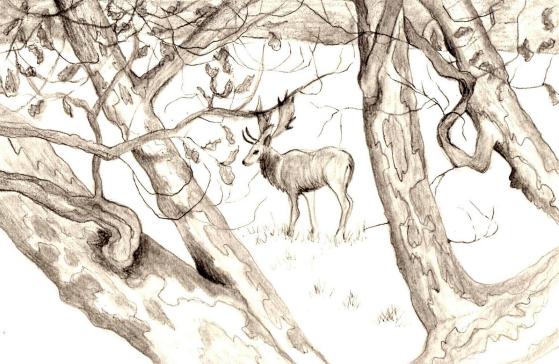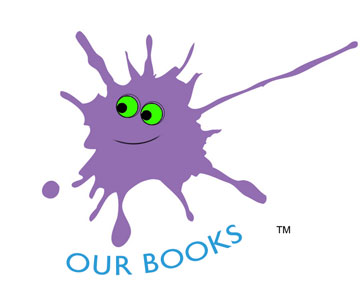The Chocolate Brownie

Johnny has a tree house.
His Dad helped him make it out of strong planks of wood. It has a proper roof, a little door and a window. The best thing is the ladder. It’s made of rope and bits of wood and goes all the way up the trunk. Johnny can pull the ladder up into his tree house and no one can reach him. No one.
When Johnny is in his tree he can feel the branches moving and hear the leaves rustling. He keeps some of his things up there – a very big shell, a poster of sharks, a tin of sweets and his book of football stickers. His Mum cut a log down the middle to make a shelf to put his best dinosaurs on.
She comes into the garden and stands at the bottom of the tree.
‘Johnny, time to do your spellings. Come down please.’
Johnny does not answer. A big crow lands on a branch near him. He likes the sound it makes.
‘Kark! Kark!’
When the bird makes the noise Johnny can see right into its beak. The crow’s eyes are like two black beads and the feathers are black and spiky.
‘Come on.’ His Mum’s still standing there.
‘Kark!’
Now Johnny’s little brother Dan is standing at the bottom of the tree.
‘Johnny?’ calls Dan.
Johnny does not answer.
‘Johnny, can I come up into the tree house. Please?’
‘Go away Dan, I don’t want you up here.’
‘Please, Johnny.’
‘Go away. Mum says you’re not allowed up here. You’re too little.’
A clump of acorns rattles onto Johnny’s roof. The noise makes him jump.
Now his sister Beth is standing at the bottom of the tree.
‘Mum’s made chocolate brownies, Johnny. If you don’t come down now I will eat yours.’
‘You wouldn’t dare!’
Johnny looks out of his little window. He can see Beth way down below. He looks down and thinks of the brownie. All squidgy and still warm from the oven. Beth holds the brownie half inside her mouth. Her eyes are all big and round.
Just then he hears voices in the garden below. Beth’s friends have come to play with her. She skips off, still holding the brownie.
He leans out of his tree house to count Beth’s friends. He’s very high up and it’s hard to see down through the leaves.
One’s called Jess, and another one’s called Ali. That’s two. Then he hears Sammy and Holly, the twins. Beth comes back and her friends follow. They stand under the tree, laughing. Five of them. No, six if you count Dan.
‘Well, do you want your brownie or not?’ Beth calls. ‘We’ve all had ours but there’s just this one left.’ She looks around at her friends. ‘We could share it out between us, couldn’t we girls?’
‘…and me,’ says Dan.
Johnny shouts, ‘Wait! Wait, I’m coming down.’
He throws the rope ladder out of his tree house and starts to climb down.
‘Please…’
Johnny climbs down a few rungs of the ladder.
‘…don’t…’
He climbs down some more rungs,
‘…eat…’
And then down the last few.
‘…mine…’
He jumps down to the ground and snatches the brownie out of Beth’s hand. It crumbles into bits. He picks the biggest bit up, but it’s got grass and a slug on it now.
He stuffs it in his mouth. Then he turns and starts climbing back up his ladder. When he gets to the top, puffing, he pulls the ladder up. Then he lies on the wooden floor of his tree-house, listening.
‘He ate the slug!’ says Jess.
‘He can’t have,’ says Holly.
‘He did, he did! Yuk!’ says Ali.
‘I feel sick just thinking about it,’ says Sammy.
‘Brave!’ Dan says.
Beth knows that Johnny would never eat a slug. But she doesn’t say anything.
Story by Julia Draper. (c) All rights reserved.










